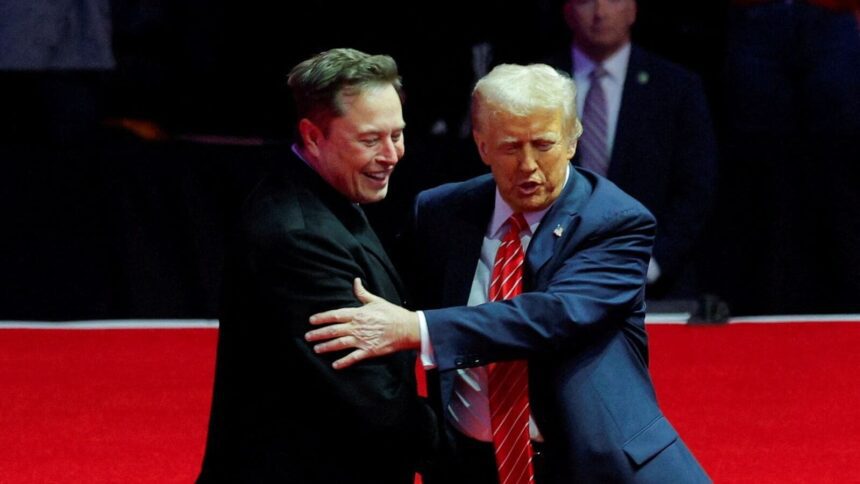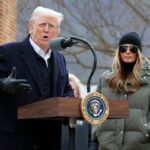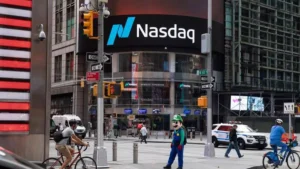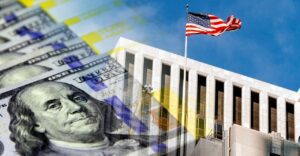In 2017, Elon Musk labeled Donald Trump as a “con artist” and “one of the world’s finest deceivers.” Now, he’s referred to as Uncle Elon at Mar-a-Lago and has found a place in the president-elect’s inner circle. Recently, they together witnessed a rocket launch. This partnership between a leading politician and the wealthiest individual in the world is set to create a significant power dynamic aimed at reducing bureaucracy, challenging liberal conventions, and deregulating in the pursuit of growth.
Mr. Trump possesses a mandate for such upheaval. Despite America’s economic strength, there is widespread discontent among Main Street, Wall Street, and Silicon Valley regarding government overspending and inefficiency. They are justified in their grievances. The government indeed requires reform. However, the Musk-led overhaul could lead to a troubling new issue for America: the rise of a volatile and corrupt oligarchy.
Just weeks after aiding Mr. Trump in clinching the election, Mr. Musk has ascended to a position of immense power. The president-elect has chosen him for a newly established advisory group known as DOGE, which aims to cut expenditures. Mr. Musk is already engaging with international leaders and advocating for cabinet positions. This is not the first instance of a business magnate wielding significant influence in America. In the 19th century, industrial titans like John D. Rockefeller wielded great power over the economy. Similarly, in the early 20th century, in the absence of a Federal Reserve, John Pierpont Morgan operated as a de facto central bank.
Mr. Musk’s enterprises differ notably as they are more internationally based than the monumental monopolies of the past. When gauged against GDP profits, Musk Inc’s valuation accounts for merely 2% of the total U.S. stock market. His principal ventures include Tesla, an electric vehicle company; SpaceX, an enterprise specializing in satellite communications and rocketry; X, previously known as Twitter; and xAI, an AI startup recently valued at $50 billion. Most of these entities hold market shares under 30% and face genuine competition. The Economist estimates that about 10% of Mr. Musk’s $360 billion wealth derives from government contracts and perks, with 15% linked to the Chinese market, and the remainder originating from both domestic and international customers.
Furthermore, Mr. Musk stands apart as a disruptor. Instead of taking advantage of monopolies to hike prices or establishing a stable banking system for financial foundation, most of Musk Inc harnesses technology to reduce costs in competitive markets. This disruption is central to Mr. Musk’s almost messianic vision, where innovation is seen as the solution to humanity’s pressing challenges, from climate change to Martian colonization. Achieving these ambitious objectives relies on a knack for continually reinventing industrial processes. His craving for unrestricted action helps to clarify his disdain for conventional standards, which he perceives as “woke” conformity. He regards the government as a barrier to progress, from the bureaucrats who allowed the U.S. government’s space-launch sector to be manipulated by defense corporations, to the California regulators imposing restrictions on Tesla’s factories.
Both Mr. Trump and Mr. Musk aspire to dismantle the federal government entirely. Mr. Musk has proposed that DOGE might aim to trim $2 trillion from the $7 trillion annual federal budget and dissolve numerous agencies. Such ambitions may appear unrealistic—cutting $2 trillion surpasses the government’s total discretionary spending. Nevertheless, with a budget shortfall of 6% of GDP and debt nearing 100%, reform is essential. The aging machinery of the Pentagon struggles to adapt to the era of drones and AI. The lobbying efforts by existing firms contribute to the federal regulations swelling to nearly 90,000 pages, close to an all-time peak. Even if Mr. Musk achieved only a fraction of his deregulation agenda, there is much potential upside for America.
However, what are the potential pitfalls? One significant concern is cronyism and corruption. The president-elect embodies economic nationalism, and Mr. Musk has stakes in industries deemed strategic due to geopolitical competition with China, the militarization of space, and issues such as cross-border disinformation. His closeness to power could result in regulatory and tariff manipulations that could hinder competitors in sectors ranging from automotive and cryptocurrency to autonomous driving and AI. Since the inception of September, the collective valuation of Musk Inc’s enterprises has surged by 50% to $1.4 trillion, significantly outpacing the market, as investors predict that Musk will potentially secure unprecedented advantages from his relationship with the president.
Concurrently, Mr. Musk risks missteps, especially beyond his expertise. His inconsistent decision-making in international relations is evident, particularly through his involvement in the management of the Starlink satellite service in Ukraine and his remarks comparing Taiwan’s situation to that of Hawaii. His fondness for public attention, conspiracy theories, and the relentless flow of social media are concerning. With $50 billion of his wealth invested in China, where half of Tesla’s production takes place, he is a prime target for potential manipulation.
Additionally, he might falter even before initiating significant changes due to the unpredictability of the Trump-Musk partnership. The next president is known for his hiring and firing tendencies, while the tech mogul is notorious for his rapid turnover of executives and relationships. The intertwining of Silicon Valley libertarianism and techno-utopianism with Mr. Trump’s MAGA nationalism is inherently unstable. Successful governmental reform necessitates patience and diplomacy—qualities in which Mr. Musk is not particularly adept.
In an alternate universe
If Mr. Musk’s political influence turns out to be fleeting, it could nonetheless generate two enduring and adverse outcomes. One possibility is that lawmakers become discouraged from pursuing governmental reform. With his appointment, the subject has garnered unprecedented attention. However, if he embarks on a poorly structured agenda that culminates in dramatic failure, the drive to address spending could be set back for many years.
The second consequence may be the normalization of collusion between politicians and business magnates. As government roles expand into trade, industrial policy, and technology, incentives for state capture are on the rise. Simultaneously, Mr. Trump’s approach involves diminishing the very institutions and practices designed to prevent conflicts of interest. While America is far from resembling an emerging market, continued collaboration between powerful business figures and dominant political figures could lead to severe repercussions. Such a reality was once considered inconceivable; now it is a growing concern.
For subscribers only: to discover the intricacies of our weekly cover design, subscribe to our weekly Cover Story newsletter.
© 2025, The Economist Newspaper Limited. All rights reserved. This content is originally from The Economist, distributed under license. You can find the original article at www.economist.com










